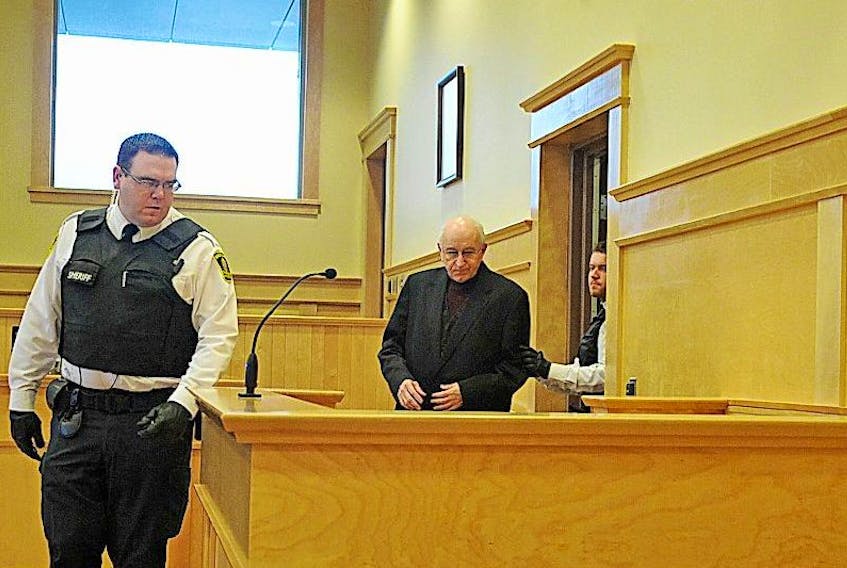The retired Roman Catholic priest had been sentenced by the Supreme Court of Newfoundland and Labrador in Corner Brook in March 2013 to nine years, 11 months and 10 days in prison for 23 counts of indecent assault against a male, nine counts of sexual assault and eight counts of assault with intent.
The offences happened when Smith was a parish priest in several western Newfoundland communities and during trips to the mainland between 1969 and 1989.
In a decision released Tuesday, the parole board said the assaults were planned and included the use of bribes, manipulation, alcohol and threats to gain his victims’ compliance. It also said Smith was under the influence of alcohol during many of the assaults.
To make its decision, which was recorded on July 6, the board said it had to determine whether Smith would not, by reoffending, present an undue risk to society before the expiration of his sentence and whether his release would contribute to the protection of society by facilitating his reintegration as a law-abiding citizen.
The board said Smith scored a 23 on the General Statistical Information on Recidivism, which indicates that four out of five offenders with similar characteristics will not reoffend within a three-year period.
A Specialized Sexual Offender Assessment undertaken in 2014 concluded Smith’s risk level for sexual recidivism is low, his need for sexual treatment is moderate and his responsivity to sexual offender treatment is high.
Smith did not meet the criteria for correctional programming, but while serving his sentence he participated in a New Beginnings Program and his institutional behavior has been without issue.
This past December, the parole board granted Smith, 77 at the time, a six-month period of day parole. At the time he was to be released to a community-residential facility under a number of conditions. The board noted Tuesday that no issues had arisen during that time.
While he has had no contact with police, the board notes local police indicate they have concerns given the nature of his offences and the number of victims involved.
The board does not indicate where Smith plans to locate upon his release just that he has secured temporary accommodations and is wait listed for a seniors apartment.
Conditions of his release include that he not be in the presence of any male children under the age of 18 unless accompanied by a responsible adult who knows his criminal history and has been previously approved in writing by his parole supervisor.
He is to have no contact with his victims or any member of their families.
He cannot own use or possess a computer or any technological device that would allow him unsupervised access to the Internet.
He is not to be in,, or near places where children under 18 are likely to be — elementary and secondary schools, parks, swimming pools and recreation centres — unless accompanied by an adult previously approved by his parole supervisor and his is not to consume, purchase or possess alcohol.
Twitter: @WS_DianeCrocker
The retired Roman Catholic priest had been sentenced by the Supreme Court of Newfoundland and Labrador in Corner Brook in March 2013 to nine years, 11 months and 10 days in prison for 23 counts of indecent assault against a male, nine counts of sexual assault and eight counts of assault with intent.
The offences happened when Smith was a parish priest in several western Newfoundland communities and during trips to the mainland between 1969 and 1989.
In a decision released Tuesday, the parole board said the assaults were planned and included the use of bribes, manipulation, alcohol and threats to gain his victims’ compliance. It also said Smith was under the influence of alcohol during many of the assaults.
To make its decision, which was recorded on July 6, the board said it had to determine whether Smith would not, by reoffending, present an undue risk to society before the expiration of his sentence and whether his release would contribute to the protection of society by facilitating his reintegration as a law-abiding citizen.
The board said Smith scored a 23 on the General Statistical Information on Recidivism, which indicates that four out of five offenders with similar characteristics will not reoffend within a three-year period.
A Specialized Sexual Offender Assessment undertaken in 2014 concluded Smith’s risk level for sexual recidivism is low, his need for sexual treatment is moderate and his responsivity to sexual offender treatment is high.
Smith did not meet the criteria for correctional programming, but while serving his sentence he participated in a New Beginnings Program and his institutional behavior has been without issue.
This past December, the parole board granted Smith, 77 at the time, a six-month period of day parole. At the time he was to be released to a community-residential facility under a number of conditions. The board noted Tuesday that no issues had arisen during that time.
While he has had no contact with police, the board notes local police indicate they have concerns given the nature of his offences and the number of victims involved.
The board does not indicate where Smith plans to locate upon his release just that he has secured temporary accommodations and is wait listed for a seniors apartment.
Conditions of his release include that he not be in the presence of any male children under the age of 18 unless accompanied by a responsible adult who knows his criminal history and has been previously approved in writing by his parole supervisor.
He is to have no contact with his victims or any member of their families.
He cannot own use or possess a computer or any technological device that would allow him unsupervised access to the Internet.
He is not to be in,, or near places where children under 18 are likely to be — elementary and secondary schools, parks, swimming pools and recreation centres — unless accompanied by an adult previously approved by his parole supervisor and his is not to consume, purchase or possess alcohol.
Twitter: @WS_DianeCrocker









